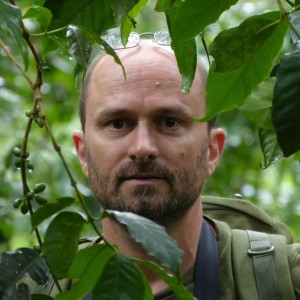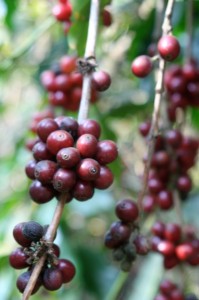On October 9-12, Sustainable Harvest®’s 12th-annual Let’s Talk Coffee® conference outside Panama City will bring together more than 500 stakeholders throughout the specialty-coffee supply chain, including roasters, producers, and financiers. Leading up to the event, we’re profiling some of the people and elements that make Let’s Talk Coffee an unforgettable, one-of-a-kind event.
 One of the most exciting draws at this year’s Let’s Talk Coffee® is Dr. Aaron P. Davis, the leader of coffee research at the United Kingdom’s Royal Botanic Gardens, Kew. He has worked in coffee since joining the Kew staff in 1997, and his work includes the naming and classification of species, molecular studies, conservation, climate change, sustainable development, and pests. Dr. Davis is the world’s leading authority on wild species, and over the course of his career he has discovered more than 20 new coffee species.
One of the most exciting draws at this year’s Let’s Talk Coffee® is Dr. Aaron P. Davis, the leader of coffee research at the United Kingdom’s Royal Botanic Gardens, Kew. He has worked in coffee since joining the Kew staff in 1997, and his work includes the naming and classification of species, molecular studies, conservation, climate change, sustainable development, and pests. Dr. Davis is the world’s leading authority on wild species, and over the course of his career he has discovered more than 20 new coffee species.
At Let’s Talk Coffee®, Dr. Davis will take part in a panel about the acclaimed Geisha varietal on Friday morning, and on Saturday morning he will deliver a talk about genetic diversity related to climate change. He talked to Sustainable Harvest® about his research work, what it’s like to study coffee, and what he may cover at Let’s Talk Coffee®.
Q: What’s your day-to-day work like at Kew?
A: That’s tricky—no day is the same—but pretty much all my work these days is coffee focused. My main project right now is in Ethiopia looking at climate resilience for the coffee sector there. Last week I was in Ethiopia presenting the project, doing a bit of workshopping, listening to other climate change actors, and meeting with partners in Ethiopia.
Q: Why do you find coffee to be a worthwhile area of study?
A: It’s exciting, but it’s also multi-dimensional and all-encompassing. It includes some pretty exciting science, but there’s the impact on livelihoods, the environment, biodiversity preservation, and sustainability. There’s so much going on under the umbrella of coffee research that it’s very challenging. But it can be very rewarding as well. I’ve always felt that perhaps it’s possible to make some sort of difference through interventions. There’s clearly a lot of great examples where the coffee sector has made a big difference. What I particularly like is the strong connection between producer and consumer, which you don’t get in a lot of other crops.
 Q: The coffee world has changed a lot since you’ve been studying it, right?
Q: The coffee world has changed a lot since you’ve been studying it, right?
A: Absolutely. Coffee’s a great vehicle for explaining and illustrating what’s happening in the world and what needs to be done to make things better than they are at the moment. And it’s a very engaging medium—pretty much everybody drinks it or knows about it.
This is what amazed me when I started studying coffee: Here we had this enormously important global commodity supporting all these livelihoods and generating all this income, and despite a huge amount of scientific research on coffee, many of the fundamentals weren’t known at the time. And truly, many of them still aren’t known. So it’s not as if I’m digging around to find something interesting to research. There’s still so much fundamental work that we need to do.
Q: You’ll be on the Geisha panel at Let’s Talk Coffee®. As a scientist, does the fact that something taste great increase your interest in it?
A: It absolutely makes it more interesting to me, and it makes the whole atmosphere around Geisha incredibly interesting. It opens up lots of really fascinating questions about our perception of Arabica and its potential. I think Geisha can be a vehicle for explaining some of the finer, more delicate nuances of Arabica that we’ve perhaps missed. I think of the Geisha experience as a nature-nurture thing. Genetically it’s very different from many of the other coffees grown in Central America. But it illustrates how a wild-type coffee can express itself in terms of its cup profile when it’s in a different environment to that of its original country. I find that very interesting and exciting.
Q: What will your talk on the Saturday of Let’s Talk Coffee® cover?
A: I want to focus on Ethiopia, and what I want to do is bring together scientific knowledge and synthesize it into something that people can think about and will perhaps spark some creativity for them. I’m going to bring in the genetics component, and I’ll also look at the influence on climate and the potential influence on cup quality. I’ll talk about climate change and the value chain, and ask some questions with no clear answers: Who actually will pay for resilience? Who is going to pay for the damage done by climate change? What are the options, and where are the opportunities?




.png)
